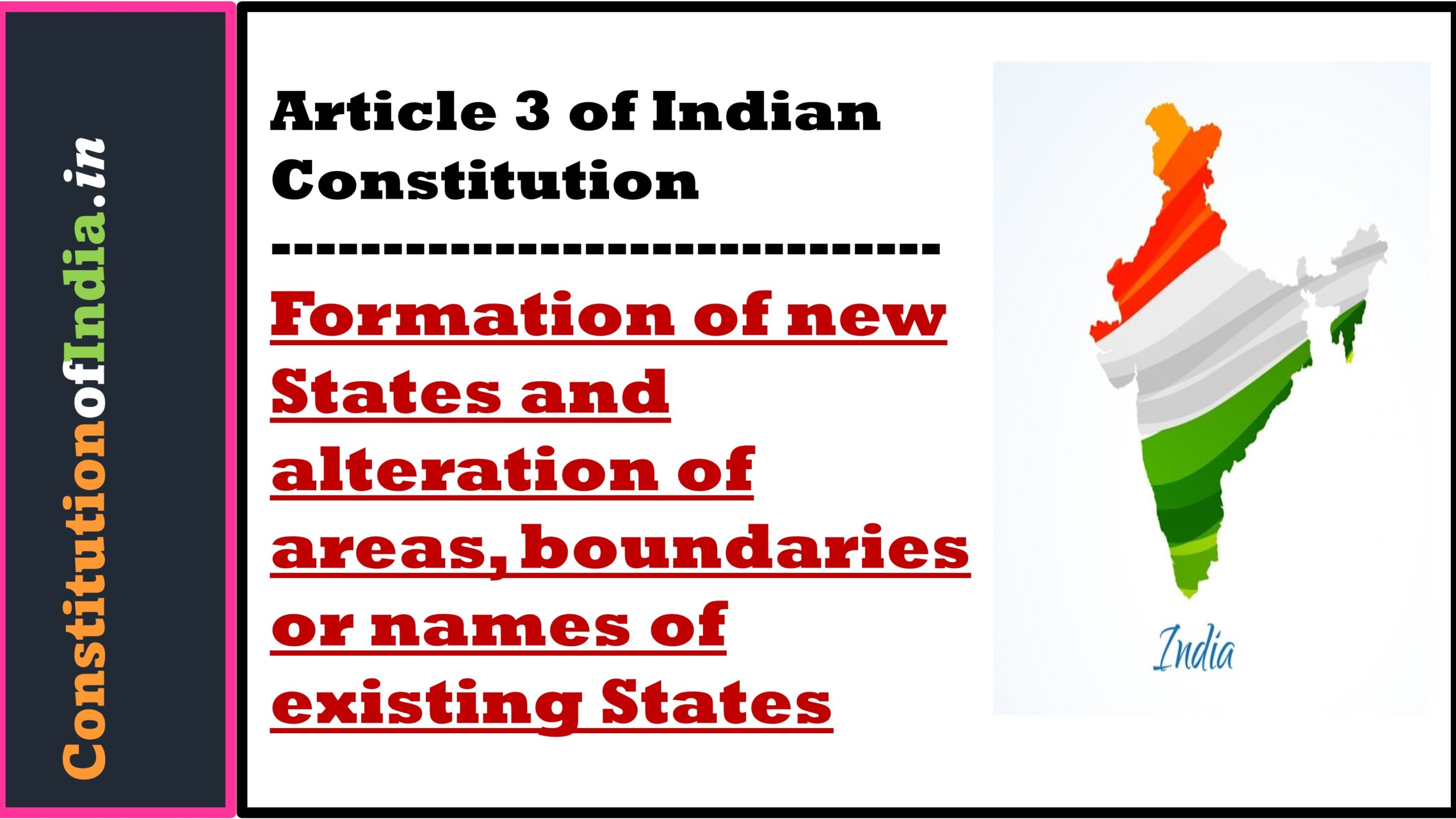Article 3 of Indian Constitution: Formation of new States and alteration of areas, boundaries or names of existing States.

Article 3 Formation of new States and alteration of areas, boundaries or names of existing States
Parliament may by law—
- form a new State by separation of territory from any State or by uniting two or more States or parts of States or by uniting any territory to a part of any State;
- increase the area of any State;
- diminish the area of any State;
- alter the boundaries of any State;
- alter the name of any State: Provided that no Bill for the purpose shall be introduced in either House of Parliament except on the recommendation of the President and unless, where the proposal contained in the Bill affects the area, boundaries or name of any of the States 1***, the Bill has been referred by the President to the Legislature of that State for expressing its views thereon within such period as may be specified in the reference or within such further period as the President may allow and the period so specified or allowed has expired.
Explanation I.—In this article, in clauses (a) to (e), “State” includes a Union territory, but in the proviso, “State” does not include a Union territory.
Explanation II.—The power conferred on Parliament by clause (a) includes the power to form a new State or Union territory by uniting a part of any State or Union territory to any other State or Union territory.]
FAQs on Article 3 of the Indian Constitution
Q1: What is Article 3 of the Indian Constitution about? ‘
Article 3 of the Indian Constitution deals with the power of the Parliament to form new states, alter the boundaries of existing states, or change the names of states.
Q2: What is the purpose of Article 3?
The purpose of Article 3 is to provide a constitutional mechanism for reorganizing states in India to better accommodate the aspirations and interests of different regions or communities.
Q3: What powers are granted to the Parliament under Article 3?
Article 3 grants the Parliament the power to:
- Form new states by separating territories from existing states.
- Merge two or more states or parts thereof to form a new state.
- Alter the boundaries of existing states.
- Change the name of any state.
Q4: Can the Parliament create new states without the consent of the affected states?
No, the Parliament cannot create new states without the consent of the affected states. The consent of the state legislatures involved is necessary for the formation of new states or alteration of boundaries.
Q5: How is the consent of the affected states obtained under Article 3?
The President of India seeks a proposal from the concerned state legislature(s) and refers it to the Parliament. The proposal is then discussed and approved by both houses of Parliament. If approved, the President gives his/her assent, and the new state or altered boundaries come into existence.
Q6: Can the Parliament alter the boundaries of states arbitrarily?
No, the Parliament cannot alter the boundaries of states arbitrarily. The alteration of boundaries must be based on proper consultation, discussions, and the consent of the affected state legislatures.
Q7: Are there any limitations or conditions specified in Article 3 for forming new states or altering boundaries?
Yes, there are certain limitations and conditions outlined in Article 3, such as maintaining the integrity and security of India and considering the linguistic and cultural factors of the regions involved.
Q8: Can Article 3 be amended?
Yes, Article 3 can be amended through the constitutional amendment process, which requires the approval of both houses of Parliament and ratification by the majority of state legislatures. However, any amendments should be consistent with the principles of federalism and the interests of the affected states.
Q9: Has Article 3 been used in the past to reorganize states?
Yes, Article 3 has been utilized in the past to reorganize states in India. Examples include the formation of new states like Telangana, Uttarakhand, and Chhattisgarh, as well as alterations in state boundaries.
Q10: Are there any legal challenges to the exercise of power under Article 3?
There have been instances where the exercise of power under Article 3 has faced legal challenges, particularly concerning the validity of the consent obtained or the manner in which reorganization was carried out. These challenges are dealt with by the judiciary, which ensures adherence to constitutional provisions and principles